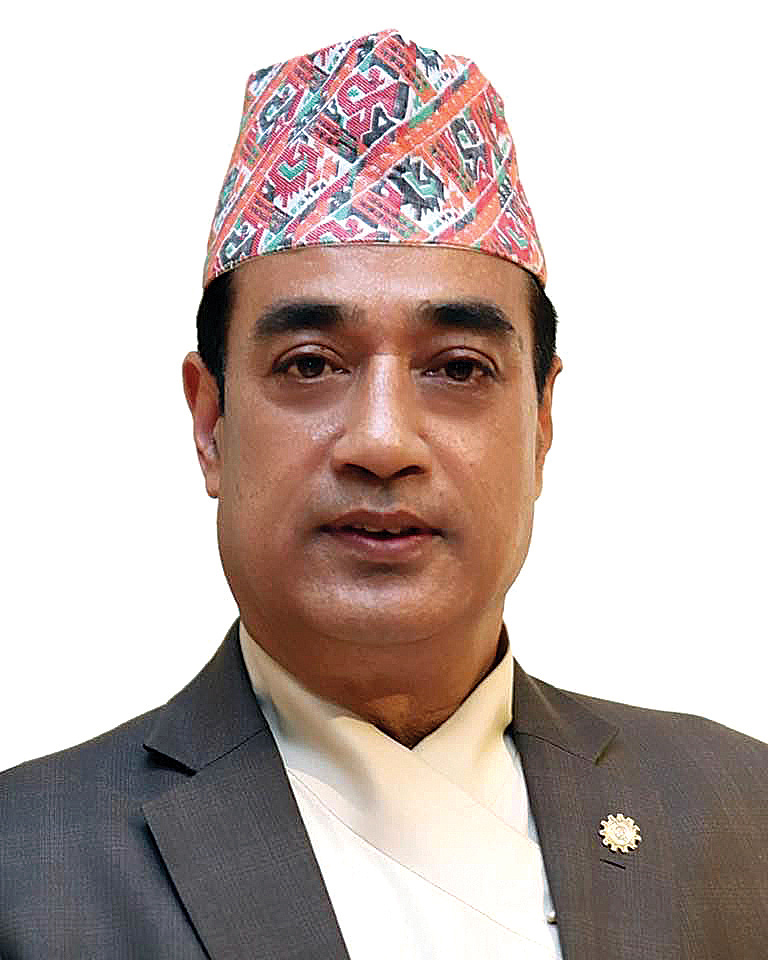
Political parties remain indecisive about taking forward the Millennium Challenge Corporation Compact signed between Nepal and the United States of America on September 14, 2017. However, umbrella bodies representing the private sector of the country issued a joint statement in early October urging the parliament to take a rational decision on the agreement as it has remained in limbo since long.
Private sector umbrella bodies - Federation of Nepalese Chambers of Commerce and Industry, Confederation of Nepalese Industries and Nepal Chamber of Commerce have urged the government, parliamentarians, civil society and concerned stakeholders to take forward the agreement signed with the MCC stating that the grant aid is critical to develop electricity transmission network along with cross-border electricity trade infrastructure. They have stressed that transmission network is key for industrialisation in the country as well as to realise Nepal’s long-awaited dream of exporting electricity.
Considering the growing demand for clean, green, renewable and reliable electricity in the region, Nepal must have proper infrastructure to realise its potential for electricity trade. According to the private sector, “There is nothing objectionable with MCC or mobilising American aid to execute two proposed projects – high-capacity electricity transmission network along with cross-border electricity trade infrastructure and the road upgradation project.”
Prime Minister Sher Bahadur Deuba has been stating at public forums that the country must ratify the Compact signed with the United States underpinning the fact that negative perception regarding the MCC aid has taken root amidst the public due to widespread negative publicity from different vested groups. “MCC’s cooperation is solely for Nepal’s development so that the country can move towards a higher growth trajectory to achieve its socio-economic growth. MCC has already clarified the queries submitted by the government based on public concerns and we have to endorse the agreement as early as possible,” the Prime Minister said in a recent address while visiting the far-western region to take stock of the devastation caused by floods, landslides and inundation.
However, Prime Minister Deuba has yet to begin talks to forge consensus within the coalition of ruling parties though he did make a commitment to ratify the Compact through the parliament during the visit of MCC Vice President Fatema Z Sumar in the second week of September this year.
Meanwhile, Foreign Minister Narayan Khadka has said that consensus among political parties is a must to ratify the MCC Compact. “MCC’s cooperation is critical for Nepal’s development, however it will be difficult to ratify the Compact in the parliament without consensus among political parties.” Khadka believes the MCC Compact will be endorsed once political parties develop a common stance on it.
The Deuba-led government had signed the Compact with MCC back in September 2017 with expectations of developing energy transmission and transport network in Nepal, paving the way for the country to attract more domestic and foreign investment, foster economic growth and reduce poverty, which is the main objective of the MCC aid.
Erstwhile Finance Minister Dr Yubaraj Khatiwada had tabled the agreement for parliamentary proceedings on July 16, 2019, however, it has been reported that the speaker of the Lower House was reluctant to incorporate it in the schedule for discussion in the parliament. The agreement will help mobilise $500 million grant aid for the execution of two projects – high-capacity transmission line project and road upgradation project – selected by Nepal based on the study, Nepal Growth Diagnostics-2011, and Nepal will chip in $130 million as counterpart fund under the ‘Compact Programme’. It has been said that the execution of these two projects will provide necessary impetus to diagnose the constraints of growth.
The grant offered by the United States through MCC – independent cooperation agency led by the foreign secretary of the United States – is the largest ever one-time grant assistance received by Nepal in the seven-decade long diplomatic relations between the two nations.
 We have done a thorough study of the MCC Compact signed with the United States. We didn’t see anything objectionable in the agreement. The private sector of the country has made its opinion public as the agreement has remained stalled since long and political parties, government and parliamentarians must act on it. This is a bulk assistance offered by the United States for infrastructure development and it aims to address the constraints of economic development and pave the way for accelerating growth to alleviate poverty.
We have done a thorough study of the MCC Compact signed with the United States. We didn’t see anything objectionable in the agreement. The private sector of the country has made its opinion public as the agreement has remained stalled since long and political parties, government and parliamentarians must act on it. This is a bulk assistance offered by the United States for infrastructure development and it aims to address the constraints of economic development and pave the way for accelerating growth to alleviate poverty.
 The private sector umbrella bodies have issued a joint statement urging the concerned agencies to take forward the agreement with the MCC to mobilise the $500 million aid for developing electricity transmission and road networks. The private sector always favours development and the grant aid has been offered for the development of Nepal.
The private sector umbrella bodies have issued a joint statement urging the concerned agencies to take forward the agreement with the MCC to mobilise the $500 million aid for developing electricity transmission and road networks. The private sector always favours development and the grant aid has been offered for the development of Nepal.
 Nepal and the United States of America share a seven-decade-long unique relation and we’ve been receiving support from them since long. The agreement with the MCC is at a standstill since long. In this context, the private sector umbrella bodies have given a statement stating that considering the long-standing relation between the two countries and generous support of the US in Nepal’s socio-economic development we should not keep the MCC Compact in a deadlock for long.
Nepal and the United States of America share a seven-decade-long unique relation and we’ve been receiving support from them since long. The agreement with the MCC is at a standstill since long. In this context, the private sector umbrella bodies have given a statement stating that considering the long-standing relation between the two countries and generous support of the US in Nepal’s socio-economic development we should not keep the MCC Compact in a deadlock for long.
MCC Vice President visits Nepal
A high-level delegation from the United States led by Vice President of Millennium Challenge Corporation (MCC) Fatema Z Sumar visited Nepal in the second week of September this year with expectations of parliamentary ratification of the agreement signed with MCC back in September 2017. The grant aid of $500 million offered by MCC for the economic development of Nepal has been a highly politicised foreign assistance and the visit of the Vice President was focused on seeking political solution for the pact’s early ratification. “Parliamentary approval is must and we are looking for early ratification of the Millennium Challenge Compact,” Sumar said after concluding her four-day visit. “This is an important gift for the economic development of Nepal from the American people.” Sumar held meetings with Prime Minister Deuba, Opposition leader KP Sharma Oli, newly-formed Nepal Communist Party (Unified Socialist) Chairman Madhav Kumar Nepal, Chairman of Communist Party of Nepal (Maoist Centre) Pushpa Kamal Dahal, Chairmen-duo of Janata Samajbadi Party Dr Baburam Bhattarai and Upendra Yadav, and Chair of Loktantrik Samajbadi Party, Mahanta Thakur. Along with the coalition partners of the government, the delegation held separate meetings with Minister for Finance Janardan Sharma and Minister for Energy Pampha Bhusal and gave a clear message that the United States will no longer wait for the ratification of the MCC if the political parties and the government are still unclear on whether or not to ratify it. It is reported that Sumar has given a clear message to the high-level political leaders that the MCC will channelise the resources to other resource-starved countries if Nepal is reluctant over it. “We are not here to put pressure for the ratification of the Compact. If the government and political leaders think the cooperation is important for Nepali people they should take forward the Compact towards ratification,” Sumar said during a press briefing after concluding her Nepal visit.MCC always ready to clarify and maintain transparency
The MCC had also clarified Nepal’s concerns on the agreement on the basis of questions sent by the government (Ministry of Finance) in view of the negative criticism that was widespread prior to the visit of MCC Vice President. The MCC has dismissed that the bulk assistance from the US has its security interest and it will involve Nepal in military alliance with US and its allies under Indo-Pacific Strategy which could be deadly as the country is situated between the global giants – India and China. On the other hand, there were concerns that Nepal would have to compromise its sovereignty once the Compact is ratified and the projects were selected based on the interest of the United States. MCC Vice President Sumar during her visit said she had received overwhelming response regarding the cooperation after Nepal was selected for the Compact programme in 2014. “It is a pity that the MCC compact has been victimised through rumours and negative publicity,” she said on her arrival in Nepal, adding, “MCC grant is development aid and it has no hidden agenda.” “As a law, the Compact honours the Constitution of Nepal and its sovereignty,” said Sumar. However, the MCC delegation was silent regarding the deadline for the Compact to be endorsed by the parliament. “The agreement honours the Constitution of Nepal and the Compact will be equivalent to law, once it is ratified,” said Shankar Sharma, former Ambassador to the United States and former Vice Chairman of the National Planning Commission. “It could take a longer time to formulate laws based on the agreement or we have to make amendments in various laws to execute the projects under the MCC cooperation.” As per Sharma, rather than formulating laws and making amendments in laws for the execution of the Compact, it would be more convenient to execute the projects if the Compact itself receives the status of a law considering the five-year deadline to complete the project execution after it commences. Once the Compact is turned into law and ratified from the parliament it will help Nepal to implement the high-capacity transmission line and road upgradation projects within the five-year deadline without any obstruction despite the issues regarding implementation contradict with national laws. Once the Compact becomes law, the provisions of Compact will prevail in project execution if issues contradict with national laws. This provision is carried to execute the projects within the stipulated timeframe. “And it is not true that the Compact will prevail for a long time. Its validity will end along with the completion of the project,” said Sharma, “Similarly, if any party wants to scrap it even during the execution phase the agreement has a provision to scrap the agreement through a 30-day prior notice.” MCC has also dismissed all these claims stating that US law prevents military activities during MCC assistance and this is purely focused on helping Nepal to move forward towards a higher growth trajectory by opening avenues for fresh investments.Private sector favours ratification of MCC Compact
Following the visit of MCC Vice President Sumar, it was expected that the political parties would hold discussions on the issue and develop a common stance on MCC’s cooperation. However, it could not happen. The country’s private sector has come out proactively urging political parties, government and parliamentarians to ratify the agreement as the grant is proposed to be spent on critical infrastructure that will help lure further investment. The country has been starved of resources to make investments to revive the economy that has taken a downturn due to the Covid 19 pandemic and should welcome the aid based on national interest. The MCC Compact, signed four years back, has been in limbo since the last two years, despite being registered at the parliament by the government. “Foreign investment has dropped by 49% in this fiscal and there is fierce competition among countries to lure resources from available windows,” reads the joint statement issued by FNCCI, CNI and NCC. “In this context, $500 million development aid is critical for Nepal that is struggling with depleting foreign exchange reserves due to surging imports after the government lifted stringent measures that had been enforced to stem the spread of the deadly respiratory disease.” The private sector umbrella bodies have expressed concerns about the energy that was wasted as spill during the wet season as run-of-the-river based hydropower projects operate at an optimum capacity during the season. The demand pattern of energy in Nepal and India is opposite as Nepal requires more energy during winters while demand rises in India during the summer season. “The cross-border energy trade infrastructure along with reliable transmission network in the country will pave the way for cross-border energy trade and energy exchange, which will lure further domestic and foreign investment in energy generation,” the private sector bodies said in their joint statement, “Similarly, there will be prospect of industrialisation when Nepal develops the capacity to serve reliable, affordable, clean energy to industries within our territory.” Private sector umbrella bodies have also opined that the project governance in Nepal will also improve from the experience of executing the $630-million projects within five years since their commencement. Not only in Nepal, more than 30 countries in different continents of Asia, Europe, South America and Africa have executed development projects under MCC Compact. Most importantly, Mongolia that shares a border with China and Russia has received Compact funding on two occasions despite the country’s sensitive geopolitical location. Devendra Raj Pandey, former minister and prominent member of Nepal’s civil society, has said that Nepal has experience of maintaining cordial and amiable relation with all power nations including neighbours even during the Cold War. “We should not be used by one nation against another, this is also the spirit of our foreign policy,” he said, “We should not be very sensitive about our geopolitical location. We are free and independent to keep relations with any nation for the benefit of Nepal and Nepali people.” What has triggered the private sector proactive response to MCC? Shekhar Golchha President, FNCCI We have done a thorough study of the MCC Compact signed with the United States. We didn’t see anything objectionable in the agreement. The private sector of the country has made its opinion public as the agreement has remained stalled since long and political parties, government and parliamentarians must act on it. This is a bulk assistance offered by the United States for infrastructure development and it aims to address the constraints of economic development and pave the way for accelerating growth to alleviate poverty.
We have done a thorough study of the MCC Compact signed with the United States. We didn’t see anything objectionable in the agreement. The private sector of the country has made its opinion public as the agreement has remained stalled since long and political parties, government and parliamentarians must act on it. This is a bulk assistance offered by the United States for infrastructure development and it aims to address the constraints of economic development and pave the way for accelerating growth to alleviate poverty.
‘Pseudo nationalism is suicidal; we must be wise and pro-Nepal’Despite having a pious objective, we can say it has been victimised by the different interest groups in the name of nationalism. The pseudo nationalism did not allow us to avail resources from the World Bank in 1994 to execute the Arun III hydroelectricity project. The World Bank pulled out from investing in the project even after all the groundwork was done and dusted. It was a great loss and we went through the misery of rolling blackouts (loadshedding) for decades. This has caused a huge industrial output loss, and severely affected the lives of people and potential of growth. If Arun III had been executed, we would have per capita income of around $1,700 at this time. The pseudo nationalism proved worthless, which is again resurfacing regarding MCC grant aid. In this sense, pseudo nationalism is suicidal, we must be wise and pro-Nepal. Nationalism should be the prosperity of Nepali people. When we made public our opinion, we were asked from different segments of society on why the private sector had issued such a statement. I must say, the private sector in the country is organised, can give valued judgement and has been playing a critical role in the socio-economic development of the nation. We’re not lobbying for any agency or the government. This is our independent view that the country should mobilise the grant aid in the proposed infrastructure projects. Vishnu Agarwal President, CNI
 The private sector umbrella bodies have issued a joint statement urging the concerned agencies to take forward the agreement with the MCC to mobilise the $500 million aid for developing electricity transmission and road networks. The private sector always favours development and the grant aid has been offered for the development of Nepal.
The private sector umbrella bodies have issued a joint statement urging the concerned agencies to take forward the agreement with the MCC to mobilise the $500 million aid for developing electricity transmission and road networks. The private sector always favours development and the grant aid has been offered for the development of Nepal.
‘Private sector is always development friendly and MCC grant is for development’When we have high-quality infrastructure, it will enhance our capability and foster an environment to attract fresh investment. The high-capacity transmission network is key for industrialisation as it will ensure reliable electricity supply. Similarly, cross-border electricity trade is essential for Nepal to export excess electricity as well as for energy exchange with neighbouring India in the immediate future. On top of that execution of electricity transmission and road upgradation projects will help transfer new technologies, skillsets and our project governance can be improved from the lessons learnt from the MCC-funded projects as they have to complete the projects within five years of commencement. Rajendra Malla President, Nepal Chamber of Commerce
 Nepal and the United States of America share a seven-decade-long unique relation and we’ve been receiving support from them since long. The agreement with the MCC is at a standstill since long. In this context, the private sector umbrella bodies have given a statement stating that considering the long-standing relation between the two countries and generous support of the US in Nepal’s socio-economic development we should not keep the MCC Compact in a deadlock for long.
Nepal and the United States of America share a seven-decade-long unique relation and we’ve been receiving support from them since long. The agreement with the MCC is at a standstill since long. In this context, the private sector umbrella bodies have given a statement stating that considering the long-standing relation between the two countries and generous support of the US in Nepal’s socio-economic development we should not keep the MCC Compact in a deadlock for long.
‘Nepal should honour and enforce the contract’We welcome MCC’s cooperation in Nepal for installing high-capacity transmission network and road upgradation. And as the Compact has been tabled in the parliament, now the ball is in the court of the parliament on whether to endorse or reject the grant aid. However, the parliament has not entered into any discussion on it. Most interestingly, we started witnessing excessive politicisation as the top leaders who were previously supporting the MCC aid, started opposing once they were out of the government. We should not humiliate or tempt other countries for certain political benefits of any leader or political party. We have urged the government and parliamentarians to take forward the MCC Compact as the private sector always honours contracts. The Compact signed by the government is a form of contract that must be abided once two nations agree on it after a series of negotiations.
Published Date: November 23, 2021, 12:00 am
Post Comment
E-Magazine
RELATED Feature





